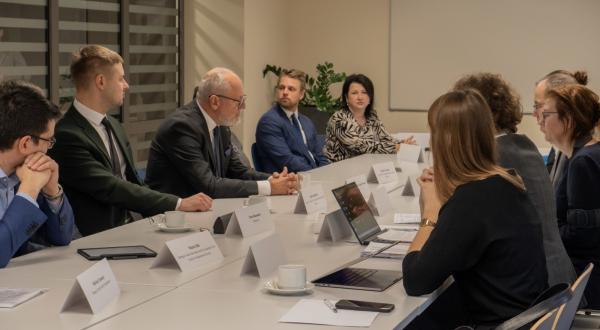Visiting professor from Germany evaluates medical students at RSU
The national examinations for Latvian and international students at Rīga Stradiņš University (RSU) were held from 27 to 29 May this year. Professor Peter Erich Goretzki (pictured), an endocrine surgery professor from Charité Universitätsmedizin Berlin, was appointed Deputy Chair of the National Examination Board this year. He was appointed to ensure that the 6th year students’ knowledge and skills meet the international standard and fulfil the requirements of leading European clinics and medical universities.
Students have good theoretical knowledge
RSU students' theoretical knowledge was tested on the first day of the exams, with a portion of the day devoted to solving various clinical case tasks. Evaluating the first day Professor Goretzki acknowledged that RSU students' theoretical knowledge is very good. The Professor also approved of the open question form of the exam.
For comparison – German medical universities have a one-day final exam that consists of a theoretical part and a part devoted to the analysis of a clinical case.
The theoretical part involves a multiple-choice test instead of the open question exam that RSU uses. The Professor further expressed his opinion that free-form answers or essays better reveal students’ knowledge and personalities. Multiple-choice tests don't always reflect a student's level of knowledge completely, because they don't require complex thinking. ‘However,’ the Professor adds with a smile, ‘multiple choice tests make the examination easier for the board, because the tests can be checked quicker.’
Simulation as a modern way of testing skills
The second day of exams at RSU was innovative – students’ practical manipulation skills were tested at the RSU Medical Education Technology Centre. Professor Goretzki explains that most medical universities don't use such practical tests during exams, but he emphasies their importance. A young medical student would gladly visit patients as soon as they have started their medical studies. In reality, however, they only get the opportunity to do this after two or three years. Only then are they allowed to perform their first procedures such as injections or taking blood samples.
Before visiting a patient a prospective physician has to learn the aforementioned procedures thoroughly through simulations, by using dummies or with the help of virtual reality. Therefore it is only logical that a students’ skills should be tested using these same educational technologies during an exam. Tests like these allow for students’ ability to treat patients without putting them at risk to be determined in a much more objective and precise way. The importance of using of simulations and modern technologies in medical study programmes is increasing. Professor Goretzki predicts that computer programs will be used to determine whether or not a student has passed their exams in 10 years.
Looking back at the third day of exams, during which students' bedside manner was tested at eight medical institutions in Riga simultaneously, Professor Goretzki emphasises what a great opportunity this was to assess the students' ability to cooperate with colleagues. During the exam experienced physicians assessed not only the students' knowledge, skills and competence, but also their resistance to stress and how prepared they were psychologically to being physicians.
Why is the participation of visiting professors necessary?
Professor Goretzki describes invitating international professors to help audit state exams as a testament to RSU's progress towards European level high-quality education. It demonstrates RSU's self-confidence and belief in their students. By engaging visiting professors the level of RSU students’ knowledge becomes known to the international public. The various visiting professors bring their own unique experience, and therefore their participation provides an international perspective for the students. The Professor smilingly compares the situation at RSU with universities in Germany and comments that it is unlikely that a university in his country would invite international professors to assess medical students. Most universities in Germany would be self-assured and think that it is no necessary.
Professor Goretzki pointed out that his participation in the RSU exams is beneficial for him too, because he will now return home with fresh experiences and a perspective that he can implement in his teaching, or in how he examines medical students at German universities and clinics.





